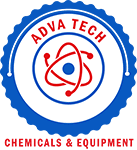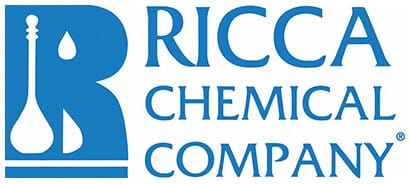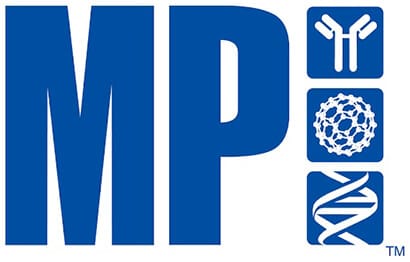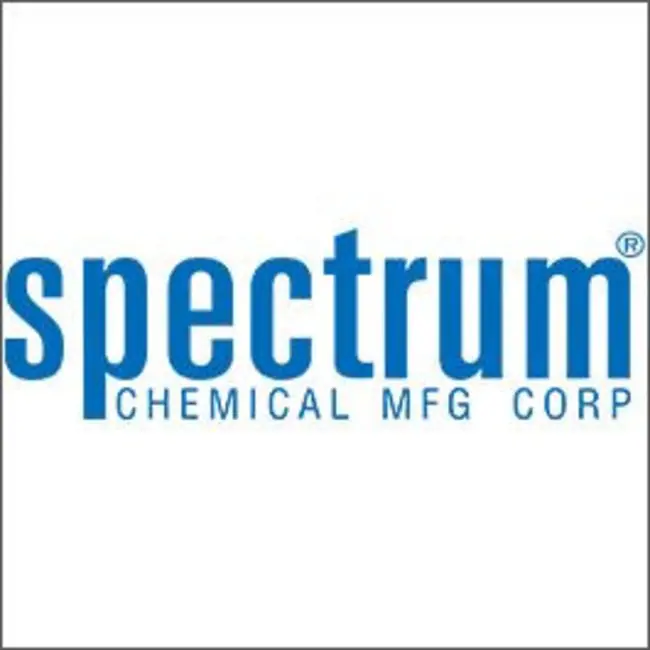5ml Resin (Total 10 ml)
Showing all 15 results
-
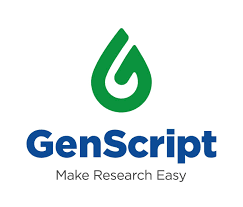
Anti-DYKDDDDK Affinity Resin Easy
$647.74 Add to cart View Product DetailsGenScript Anti-DYKDDDDK Affinity Resin Easy (Cat. No. L00907) features high binding capacity, specificity, sensitivity, stability, and reusability, making it particularly useful for the affinity purification and immunoprecipitation of DYKDDDDK-tagged fusion proteins expressed in common protein expression systems such as bacteria, yeast, and mammalian cells.
-
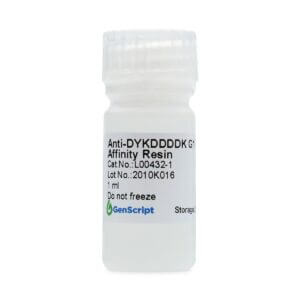
Anti-DYKDDDDK G1 Affinity Resin
$589.09 Add to cart View Product DetailsGenScript Anti‐DYKDDDDK G1 Affinity Resin (Cat. No. L00432) is designed for the purification of DYKDDDDK‐tagged protein from commonly used protein expression systems including bacteria, yeast and mammalian cells.
-

Anti-GS Linker Affinity Resin FF
$772.80 Add to cart View Product DetailsThis product is designed for purification of proteins, antibodies and compounds containing (GnS)m linker (n≥2, m≥2) from commonly used protein expression systems such as bacteria, yeast and mammalian cells.
-

Anti-HA IP Resin
$1,207.50 Add to cart View Product DetailsPrinciple
Add the sample containing the HA-tagged protein
to the Anti-HA IP Resin and allow the protein bind to the Resin during a short
time incubation. Then the HA-tagged protein can be eluted off the beads, or
used directly for pull-down of target protein.
Material Supplied
Genscript Anti-HA IP Resin is an agarose beads
coupled to THE™ HA Tag Antibody, mAb, Mouse (Genscript, A01244).
The antibody recognizes C-terminal, N-terminal, and internal HA tagged-fusion
proteins. It is supplied as a suspension in 50% glycerol containing 10 mM sodium phosphate, 150 mM
sodium chloride, pH 7.4, 0.02 % (w/v) sodium azide (PBS/A).
Storage and Stability
Store the resin: Anti-HA IP Resin is supplied at
-20°C.Do not store the gel at freezing temperatures in the absence of glycerol.
Store the Column: Wash the column three times
with 5 ml of TBS/A (TBS containing 0.02 % sodium azide) then add another 5 ml
of TBS/A and store at 2-8°C without draining.
Additional Buffers Needed
Equilibration buffer: 50 mM Tris, 150 mM NaCl, pH 7.4.
1×SDS Sample Buffer: 62.5 mM Tris-HCl (pH 6.8 at
25°C), 2% w/v SDS, 10% glycerol, 50 mM DTT, 0.01% w/v bromophenol blue. -
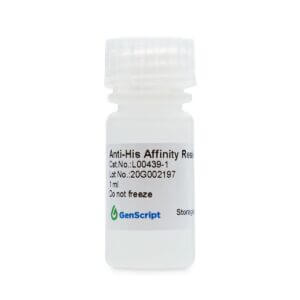
Anti-His Affinity Resin
$1,420.54 Add to cart View Product DetailsGenScript Anti-His Affinity Resin is designed for purification of His-tagged protein. It is composed of agarose and conjugated THETM anti-His monoclonal antibody. His-tagged protein in the crude samples can bind to the anti-His monoclonal antibodies coupled with the agarose, and the nonspecific proteins can be eliminated by washing. As a result, the His-tagged protein will finally be eluted with high recovery. Moreover, this product can be used for immunoprecipitation of His-tagged protein.
-

High Affinity Ni-Charged Resin FF
$55.20 Add to cart View Product DetailsGenScript
High Affinity Ni-Charged Resin FF is
an 6% highly cross-linked agarose medium covalently coupled to a chelating
agent that binds Ni2+ by four coordination sites for high-affinity
purification of polyhistidine-tagged recombinant proteins (see Figure 1) [1].
High Affinity Ni-Charged Resin FF
has low Ni2+ leakage, high protein-binding capacity and stability,
and is compatible with a wide range of additives used in protein purification.
This makes High Affinity Ni Charged Resin
FF the excellent choice for high performance purification of
polyhistidine-tagged proteins. -

MonoRab™ Anti-Camelid VHH Affinity Resin
$966.86 Add to cart View Product DetailsCamelid
VHH Antibody (also called single-domain antibody, sdAb or Nanobody by Ablynx)
is a peptide chain about 110 amino acids in length, containing one variable domain
of a heavy-chain antibody (a VHH fragment). Like a whole antibody, the camelid
VHH antibody is able to bind selectively to a specific antigen. This single-domain
antibody has a broad range of applications in biotechnical and therapeutic research
fields due to its small size, simple production and high affinity.
GenScript’s MonoRab™ Anti-Camelid VHH
Affinity Resin (Cat. No. L00905) is designed for purification of Camelid VHH
single domain antibody from commonly used protein expression systems such as bacteria,
yeast and mammalian cells. The VHH single domain antibody in cell lysate can specifically
bind to the Anti-Camelid VHH monoclonal antibody coupled to the resin. Nonspecific
binding reactions are eliminated by stringent washing steps, and the purified Camelid
VHH single domain antibody is eluted with a high recovery rate. Table
1 lists the main characteristics of GenScript’s MonoRab™ Anti-Camelid VHH
Affinity Resin.
Table 1. Characteristics of Anti-Camelid VHH Affinity
ResinProduct
content50%
settled resin in TBS with 0.02%
sodium azideMatrix 4% cross-linked
agaroseAverage
bead size90 μm Ligand MonoRab™
Rabbit Anti-Camelid VHH Antibody, mAbBinding
capacityApproximately
2-4 mg Camelid VHH protein per mL
settled resin (depending on amino acid sequence of different Camelid VHHs)Storage
and stabilityStore
at 2-8 °C for up to 12 months. Do not freeze the resin.Resin
reuseWhen
stored at 2 – 8° C, the resin can be recycled at least 5 times
with no loss of binding capability. The resin can be reused up to 10 times with
minimum loss of binding capability.Elution
methodAcid
buffer elution (pH 2.5)Reagents
compatibilityCompatible
with commonly used bacterial lysis reagents. For reagents compatible with
purification, see tables 2 and 3 in the manual. -

MonoRab™ Anti-DYKDDDDK Affinity Resin
$797.81 Add to cart View Product DetailsGenScript’s MonoRabᵀᴹ Anti-DYKDDDDK Affinity Resin is designed for optimal purification of DYKDDDDK-tagged proteins. DYKDDDDK tag is an octapeptide tag that can be added to a protein using recombinant DNA technology. It can be fused to the N-terminus or C-terminus of a target protein to facilitate detection and purification. Based on our new rabbit monoclonal antibody technology (MonoRabᵀᴹ), this resin offers high binding capacity, high purity, and resistance to high concentrations of salt or acid during protein purification. The binding capacity of MonoRabᵀᴹ Anti-DYKDDDDK Affinity Resin is 1.5 mg DYKDDDDK-tagged protein per mL of settled resin. The recombinant proteins expressed in bacterial or mammalian cells cultures specifically bind to the anti-DYKDDDDK monoclonal antibodies coupled to the resin, resulting in highly pure eluates. The resin can withstand stringent washing steps, especially with buffers containing high concentration of salt. The resin is resistant to up to 2 M NaCl, and to buffers with pH as low as 2.5.
-

MonoRab™ Anti-Humanized VHH Affinity Resin FF
$966.00 Add to cart View Product DetailsCamelid
VHH Antibody (also called single-domain antibody, sdAb or Nanobody by Ablynx)
is a peptide chain about 110 amino acids in length, containing one variable
domain of a heavy-chain antibody (a VHH fragment). Like a whole antibody, the camelid
VHH antibody is able to bind selectively to a specific antigen. This single-domain
antibody has a broad range of applications in biotechnical and therapeutic research
fields due to its small size, simple production and high affinity. However, their sequences may increase the risk of immunogenicity and
anti-drug antibody (ADA) development in humans, and thus, sdAbs are routinely
humanized during development.
GenScript’s MonoRab™ Anti- Humanized VHH Affinity
Resin FF (Cat. No. L00951) is designed for purification of humanized VHH
single domain antibody from commonly used protein expression systems such as bacteria,
yeast and mammalian cells. The VHH single domain antibody in cell lysate can specifically
bind to the Anti- Humanized VHH monoclonal antibody coupled to the resin. Nonspecific binding
reactions are eliminated by stringent washing steps, and the purified target
protein is eluted with a high recovery rate. Table 1 lists the main characteristics
of GenScript’s MonoRab™ Anti- Humanized VHH Affinity Resin FF.
Table 1. Characteristics of Anti-Humanized VHH
Affinity Resin FFProduct
content50%
settled resin in TBS with 0.02%
sodium azideMatrix 4% highly
cross-linked agaroseAverage
bead size90 μm Ligand MonoRab™
Anti-Humanized VHH AntibodyBinding
capacity>
2 mg Humanized VHH per mL settled resin (depending on amino acid sequence of
different Humanized VHHs)Storage
and stabilityStore
at 2-8 °C for up to 12 months. Do not freeze the resin.Resin
reuseWhen
stored at 2 – 8° C, the resin can be recycled at least 5 times
with no loss of binding capability. While, it can be reused up to 10 times with
minimum loss of binding capability.Elution
methodAcid
buffer elution (pH 2.5)Reagents
compatibilityCompatible
with commonly used bacterial lysis reagents. For reagents compatible with
purifications, see tables 2 and 3 in the manual. -
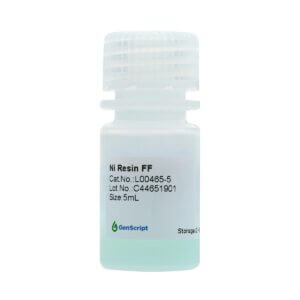
Ni Resin FF
$47.44 Add to cart View Product DetailsGenScript Ni Resin FF is a 6% highly cross-linked agarose medium covalently coupled to a chelating agent that binds Ni2+ by three coordination sites for high-affinity purification of polyhistidine-tagged recombinant proteins. Ni Resin FF has low Ni2+ leakage, high protein-binding capacity and stability, and is compatible with a wide range of additives used in protein purification. Ni Resin FF is an excellent choice for high performance purification of polyhistidine-tagged proteins.
Cat. No. Product Name Volume supplied Resin content L00465-5 Ni Resin FF 5 ml 10 ml 50% slurry L00465-25 Ni Resin FF 25 ml 50 ml 50% slurry -
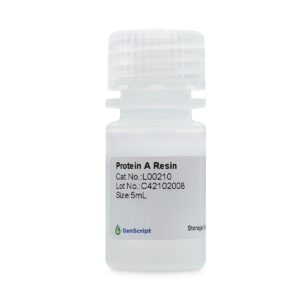
Protein A Resin
$93.15 Add to cart View Product DetailsGenScript Protein A Resin is an affinity
chromatography medium designed for easy, one-step purification of classes, subclasses
and fragments of immunoglobulins from biological fluids and from cell culture
media. Protein A Resin can also be used for immunoprecipitation of
proteins, protein complexes or antigens. The recombinant protein A ligand is
coupled to 4%
agarose. The coupling is optimized to give high binding capacity for
immunoglobulins. The static binding
capacity of Protein A Resin is greater than 20 mg human IgG/ml settled resin.
The binding capacity will
vary depending on several factors such as target antibody, flow rate etc. Table
1 lists the characteristics of Protein A Resin.
Protein A, a bacterial cell wall protein isolated
from Staphylococcus
aureus,
binds to mammalian IgGs mainly through Fc regions. Native
protein A has five IgG binding domains and many other domains with unknown
functions. Recombinant protein A contains five high
affinity IgG binding domains with other non-essential domains removed to reduce nonspecific binding. Since only the Fc region
is involved in binding, the Fab region is available for binding antigens. -

Protein A Resin FF
$346.73 Add to cart View Product DetailsGenScript’s Protein A Resin FF is an affinity chromatography media designed for easy, one-step purification of classes, subclasses and fragments of immunoglobulins from biological fluids and from cell culture media. Protein A Resin FF can also be used for immunoprecipitation of proteins, protein complexes or antigens.The recombinant protein A ligand is coupled to 4% highly cross-linked agarose. The coupling is optimized to have a high binding capacity for immunoglobulins. The static binding capacity of Protein A Resin FF is greater than 40 mg rabbit IgG/ ml settled resin. The dynamic binding capacity will vary depending on several factors such as target antibody, flow rate, etc. Table 1 lists the characteristics of Protein A Resin FF.
Protein A, a bacterial cell wall protein isolated from Staphylococcus aureus, binds to mammalian IgGs mainly at their Fc region. Native protein A has five IgG binding domains and many other domains with unknown functions. Recombinant protein A contains five high affinity IgG binding domains with other non-essential domains removed to reduce nonspecific binding. Since only the Fc region is involved in binding to recombinant protein A, the Fab region is available for binding antigens.
-
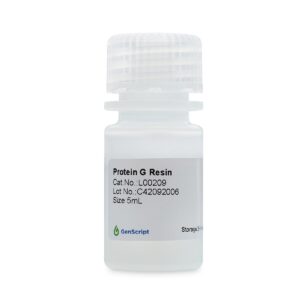
Protein G Resin
$111.26 Add to cart View Product DetailsDescription:
GenScript Protein G Resin is an affinity chromatography medium designed for easy, one-step purification of classes, subclasses and fragments of immunoglobulins from biological fluids and cell culture media. The recombinant protein G ligand is coupled to 4% highly cross-linked agarose. The static binding capacity of Protein G Resin is over 20 mg sheep IgG/ml settled resin. The dynamic binding capacity will vary depending on several factors such as target antibody, flow rate etc.
Protein G, a bacterial cell wall protein isolated from group G Streptococci, binds to mammalian IgGs mainly through Fc regions. Native protein G has 3 IgG binding domains and also sites for albumin and cell-surface binding. The latter have been eliminated from recombinant protein G to reduce nonspecific binding. Although protein G has very similar tertiary structures to protein A, their amino acid compositions differ significantly, resulting in different binding characteristics. Protein G can be used for purification of mammalian monoclonal and polyclonal IgGs that do not bind well to protein A. Protein G has greater affinity than protein A for most mammalian IgGs, especially for certain subclasses including human IgG3, mouse IgG1 and rat IgG2a. Unlike protein A, protein G does not bind to human IgM, IgD and IgA.
Total Volume:
5 ml settled resin (10 ml 50% slurry)
-
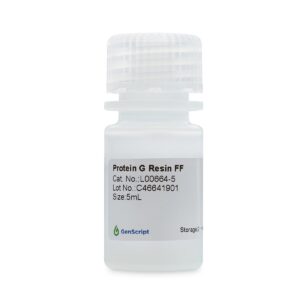
Protein G Resin FF
$369.15 Add to cart View Product DetailsGenScript Protein G Resin FF is an affinity chromatography medium designed for easy, one-step purification of classes, subclasses and fragments of immunoglobulins from biological fluids and from cell culture media. The recombinant protein G ligand is coupled to 4% highly cross-linked agarose. The static binding capacity of Protein G Resin FF is greater than 20 mg human IgG/ml settled resin. The dynamic binding capacity will vary depending on several factors such as target antibody, flow rate etc. Table 1 lists the characteristics of Protein G Resin FF.
Protein G, a bacterial cell wall protein isolated from group G Streptococci, binds to mammalian IgGs mainly through Fc regions. Native protein G has 3 IgG binding domains and also sites for albumin and cell-surface binding. The latter have been eliminated from recombinant protein G to reduce nonspecific binding. Although protein G has very similar tertiary structures to protein A, their amino acid compositions differ significantly, resulting in different binding characteristics. Protein G can be used for purification of mammalian monoclonal and polyclonal IgGs that do not bind well to protein A. Protein G has greater affinity than protein A for most mammalian IgGs, especially for certain subclasses including human IgG3, mouse IgG1 and rat IgG2a. Unlike protein A, protein G does not bind to human IgM, IgD and IgA.Cat. No. Product Name Volume supplied Resin content L00664-5 Protein G Resin FF (5ml) 10ml 50% slurry L00664-25 Protein G Resin FF (25ml) 50ml 50% slurry L00664-100 Protein G Resin FF (100ml) 200ml 50% slurry Storage
Store in 20% ethanol at 2°C to 8°C. Do not freeze.Characteristics
Ligand Recombinant Streptococcal protein G lacking the albumin-binding sites expressed in E. coli Number of IgG binding sites per ligand 3 M.W. of ligand Approximately 22 kDa PI of ligand 4.69 Degree of substitution Approximately 2 mg protein G/ml settled resin Static binding capacity ≥ 20 mg human IgG/ml settled resin Matrix spherical 4% highly cross-linked agarose Average particle size 90 μm (45-165 μm) Recommended flow rate 50-300cm/h Storage solution 20% ethanol Storage and Stability 18 months when stored unopened at 2-8 °C -
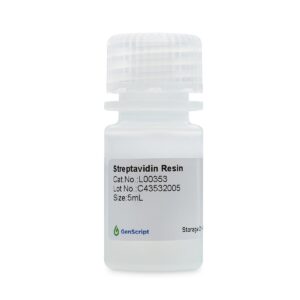
Streptavidin Resin
$136.28 Add to cart View Product DetailsGenScript Streptavidin Resin is an affinity chromatography medium designed for easy,
one-step purification of biotinylated peptides, antibodies, lectins, etc
from samples. The purified recombinant streptavidin is covalently coupling to 4%
highly cross-linked agarose. The
coupling is optimized to give high binding capacity for biotinylated molecules. The total
binding capacity of Streptavidin Resin is more
than 120 nmol of D-Biotin/ml
settled resin. Table 1 lists the characteristics of Streptavidin Resin.
Streptavidin is a biotin-binding protein found in the culture broth of the bacterium Streptomyces
avidinii. Streptavidin binds 4 moles of biotin per mole of protein with an
extremely high affinity. Streptavidin lacks carbohydrate side chains present on
avidin and has an isoelectric point of 6.5 (vs 10 for avidin) close to
where most useful biological interactions occur. As a result,
streptavidin frequently exhibits much lower non-specific binding than avidin
does.
